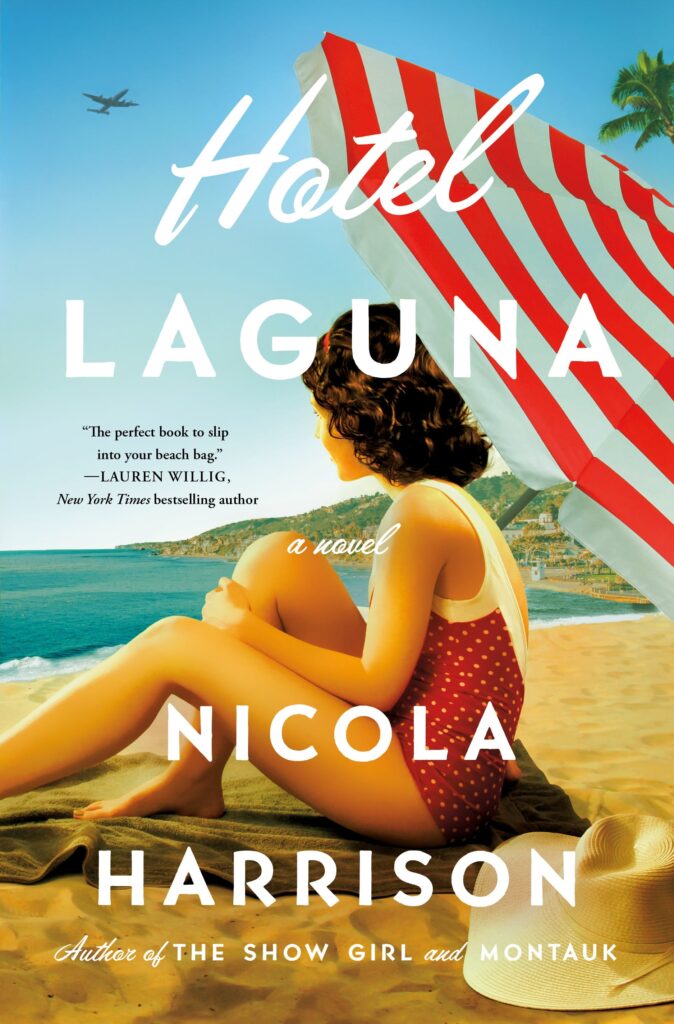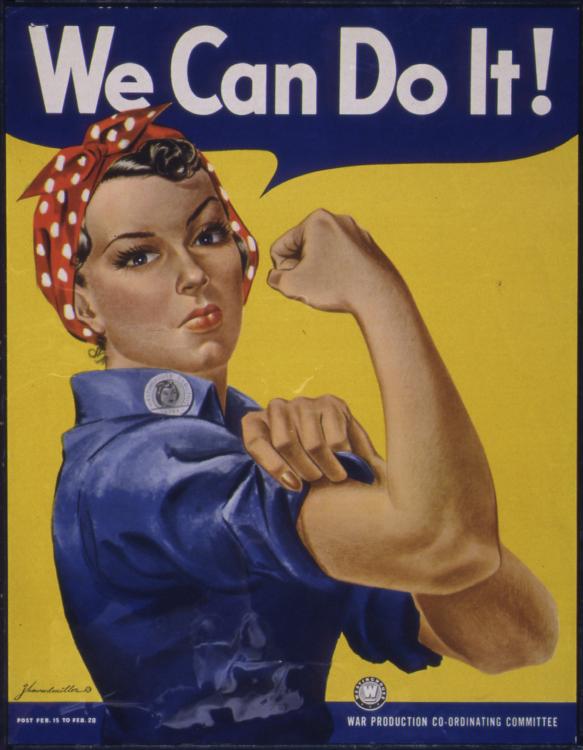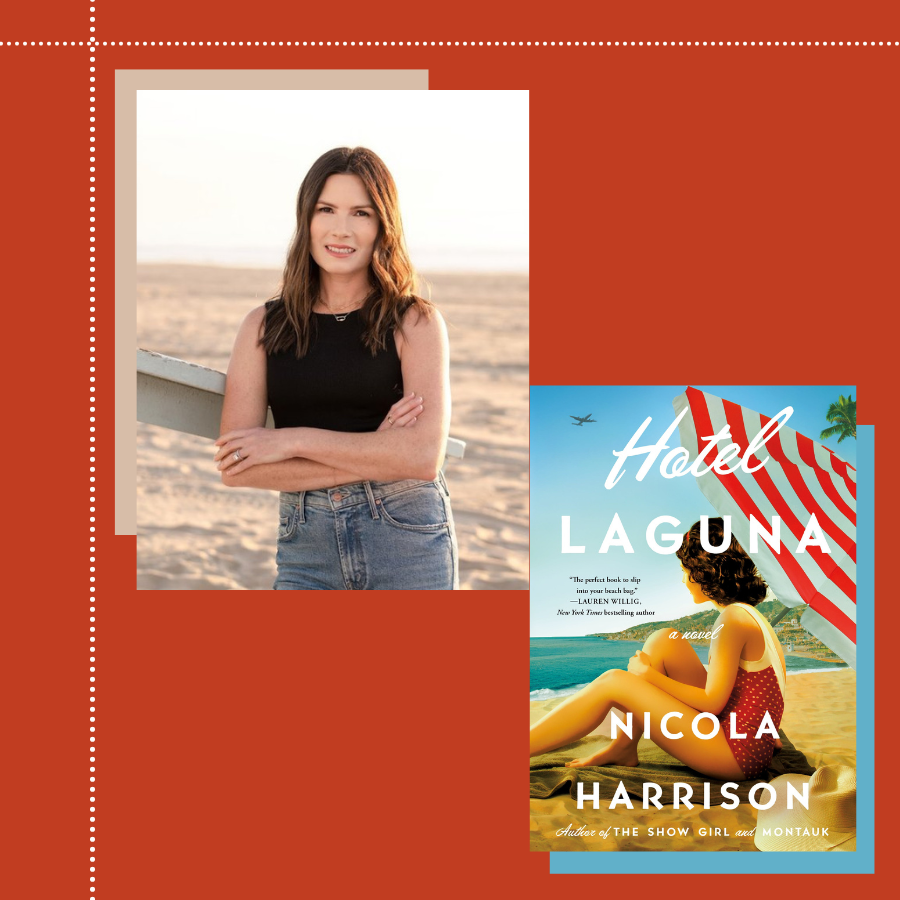Determination. Forgiveness. Love. These themes are pivotal in Hotel Laguna by Nicola Harrison. Hazel, a young woman from Wichita, Kansas, moves to Laguna Beach after losing her job building planes when men returned from World War II.
Hazel begins working as a model and assistant for Hanson Radcliff, a renowned artist with a checkered past that shows in his guarded attitude. She becomes engulfed in a long-standing scandal, hoping to find the truth.
My conversation with Nicola Harrison includes writing about a young woman forgiving herself, completing the research process, and creating body agency for Hazel.

What is your definition of feminism?
Feminism will mean different things to different people but for me it’s about recognizing and respecting a woman’s strengths, knowledge and capabilities, and leveling the playing field between male and female roles and opportunities. It’s a theme I come back to again and again in my writing. In Hotel Laguna, which is set in in the 1940’s, a young woman has the opportunity to work a “man’s job” in an airplane factory during WWII. She thrives in the role, loves the work and the sense of purpose it gives her, and then, when the war is over and the jobs are given back to the men returning from war, she’s told to go back to being a housewife and she becomes consumed with trying to grasp back that sense of achievement and purpose.
How did you create Hazel as a young and ambitious woman? How does she learn to forgive herself?
Although it was an unpopular mindset for the 1940s, Hazel wanted more for herself than to become a housewife and she certainly didn’t want to spend the rest of her life married to someone she wasn’t madly in love with. Out of ambition and drive (and desperation) she leaves the only home she’s ever known behind to discover what she’s capable of. I know from my own life experiences that as terrifying as it can be, sometimes you have to walk away from the thing that feels known and predictable in order to expand and blossom and fully live. But despite having the courage to walk away, Hazel is racked by guilt for breaking someone’s heart and for the tragedy that follows. In the end I believe she finds peace, and forgives herself by following through on her vow to make something of her life, where she is challenged and valued, where she feels she’s making a difference in her newfound community and she’s doing something meaningful.
What was your research process for the era?
My husband’s grandmother helped build airplanes on the homefront during WWII so my mother-in-law gave me a lot of insight about the time period. I also had the opportunity to interview three real-life “Rosie the Riveters” – one of them was 100 years old! I became fascinated with these women. One worked a massive hydraulic press to mold huge sheets on metal, another assembled planes from top to bottom with a rivet gun, another crawled into the tiny nose of the aircraft to wire the propellers. I was also interested in the government issued advertisements that recruited women to the war effort by comparing the work they would be doing to build aircraft to housework such as ironing or needlework.
Specifically, what I discovered while researching this time was that despite society’s best efforts to go back to the way things were after the war was over, with women returning to domestic roles, there was no turning back.
The story reads as mystery, romance, and historical fiction. How did you craft this multifaceted story?
It all started with a place – I wanted to set this story in Laguna Beach California because at the height of COVID I was planning a move to the area from the East Coast. Even though we were on lockdown and couldn’t actually travel, I wanted to live in the bohemian coastal town in my imagination while I wrote the story. From there I began researching the history of Laguna Beach and I realized that a very famous and unique art show called The Pageant of the Masters, that I’ve attended many times, actually began in the 1930s as a way to encourage the wealthy Hollywood crowd to discover the art and artists in Laguna Beach. Throw in a cantankerous, old and famous artist with a scandalous secret from his past, a tormented former soldier who’s recently returned home from war and now works as bartender in the iconic Hotel Laguna, and the quirky history of the town itself, and it all just came together.
Hazel is a model for portraits. What was important for body agency and not body exploitation?
So much of this novel is about Hazel wanting to feel comfortable in her own skin and embracing both her femininity and the more masculine aspects of her character. She might be sitting as an artists’ model, or blushing when she sees the risqué work of an artist who painted pin-up girls as nose art on airplanes, but she’s often fantasizing about working with heavy duty machinery to build planes. At some point she expressly tells her artist boss how she’d like to be captured in his paintings – in overalls and work boots at the site of an abandoned airstrip. It was important to me that she learn to have individual agency and advocate for both how she wants to represent her body, and also know how to speak up about it.
Early on Hazel feels the need to hide her body, but she later comes to explore what it means to be seen, to be immortalized in a painting or a sketch. Female empowerment wasn’t exactly a buzz phrase in the 1940s but Hazel is constantly striving for equality and demanding more for herself than most of society is willing to give at that time.
How did you want to honor people who have served America through this story?
The majority of people have certainly heard of “Rosie the Riveters” and seen the famous artwork with a woman in a bandana and the quote “You Can Do It”, but I don’t know if everyone understands the importance of this time in history and what a turning point it was for equality between men and women. I really wanted to highlight how 19 million women stepped up and took on jobs they’d never even imagined doing before. Some women felt compelled to sign up because their loved ones were away at war, while others, like Hazel, did it for personal reasons – good pay, self-fulfillment, training, and education that would otherwise be unavailable to her.

What organization would you like to amplify to our audience?
The American Rosie the Riveter Association is an organization that recognizes and preserves the history and legacy of working women, including volunteers, during World War II.
Thank you, Nicola Harrison, for speaking with Feminist Book Club about Hotel Laguna!


